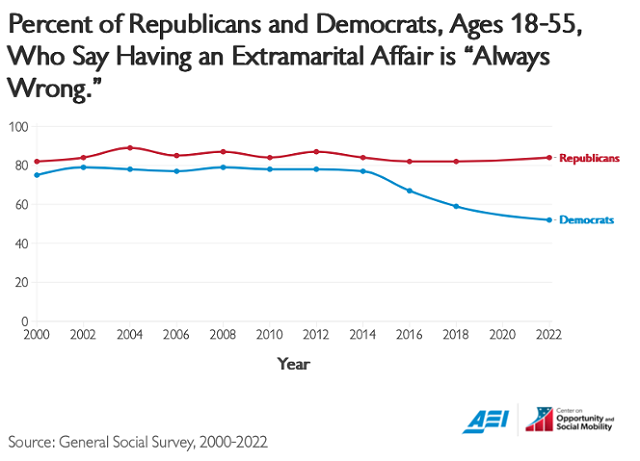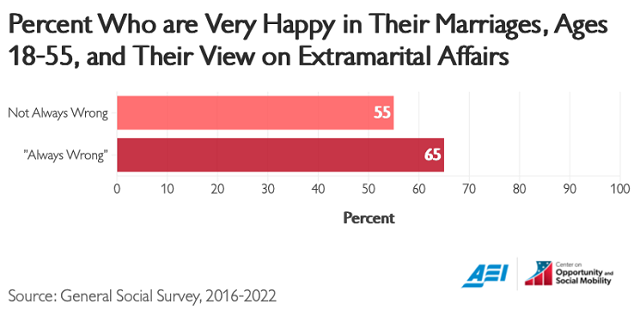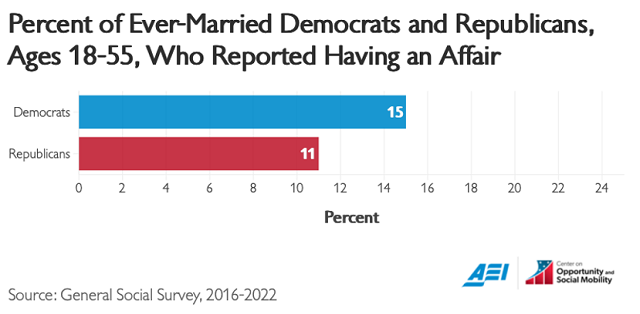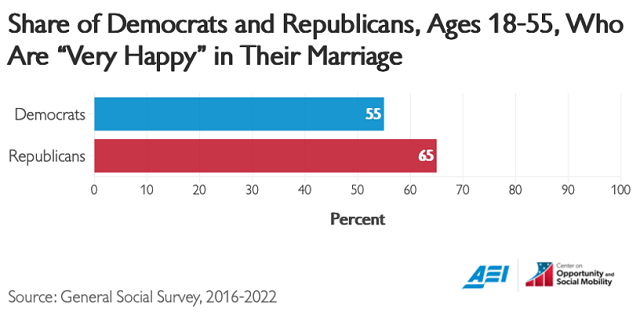Highlights
- Has the Republican standard bearer’s marital misbehavior eroded our collective commitment to the values that sustain the institution of marriage? Post This
- While more than 80% of prime-aged Republicans maintain the view that having sex with someone besides your spouse is “always wrong,” only 52% of Democrats took this position in 2022. Post This
- When it comes to marital quality, it is Republicans, rather than Democrats, who are most likely to report they are happily married. Post This
The political and legal fallout of Donald Trump’s affair with Stormy Daniels has not only complicated his run for the presidency, but it has also raised a deeper concern: Has the Republican standard bearer’s marital misbehavior eroded our collective commitment to the values and virtues that sustain the institution of marriage?
On the left, journalist Matt Yglesias wondered if Trump’s bad example has undermined women’s faith in wedlock: “I could imagine young women looking at this and seeing not-great things.” On the right, Ethics and Public Policy Center fellow Patrick Brown said he was “more concerned about the impact it might end up having on conservative male attitudes towards marriage.”
All this raises an important question: Has Trump’s rise in the Republican party led members of his party—once known for its devotion to family values—to cast aside their commitment to marital fidelity and the institution of marriage more generally?
Probably not. In fact, the data tell us it’s not Republicans but, surprisingly, Democrats who are facing the greatest marital difficulties in the Trump era.

Take infidelity. In the last decade, data from the General Social Survey (GSS), America’s premier social barometer, indicate that attitudes toward infidelity have undergone a dramatic shift. In 2000, a substantial majority of both Republicans and Democrats agreed that sex with someone other than one’s spouse was “always wrong.”
However, starting around 2014, in the wake of what Yglesias called the “Great Awokening,” when liberals moved hard to the left on a range of issues, this consensus began to fracture along party lines. While more than 80% of prime-aged Republicans still maintain the classic view that having sex with someone besides your spouse is “always wrong,” surprisingly only 52% of Democrats took this position in 2022. The shift was especially pronounced among college-educated Democrats, with only 46% embracing the classic fidelity norm by 2022. This is one example of how elite progressives have soured on the institution of marriage and the norms that sustain it.
The rising popularity of polyamory on the left is one big reason for the growing partisan divide about marital fidelity. Democrats, much more than Republicans, have embraced polyamory in recent years. Because of their instinctively progressive posture on matters related to sex and gender, Democrats have been more likely to support this new relationship fad. It helps, too, that polyamory is advertised as maximizing personal choice and sexual fulfillment, two core progressive values. This explains why a recent Pew poll found that only a minority (36%) of Democrats opposed “open marriage” compared to a majority of Republicans (64%). Today, young progressives are especially likely to express support for adopting a more flexible approach to fidelity in marriage.
But husbands and wives who embrace the classic fidelity norm and reject this permissive approach are more likely to be flourishing in their marriages today. Take a man I call Patrick in my new book, Get Married: Why Americans Must Defy the Elites, Forge Strong Families, and Save Civilization. Patrick’s a tall, handsome, and well-spoken 52-year-old redhead in sales from Virginia who meets a lot of people, plays guitar in a band on the side, and travels a lot for work, all factors that could boost his risk for infidelity. But he’s intentional about protecting his marriage: “When I’m meeting new people in my line of work, I talk a lot about my wife and kids. I want them to know I’m a family man,” he told me. His self-conscious commitment to fidelity is one reason Patrick’s wife, Kelly, gives their marriage a “10” on a scale of 1-to-10.

Patrick is no outlier. In the Trump era (2016-2022), husbands and wives who say that having sex with someone besides their spouse is “always wrong” are significantly more likely to report they are “very happy” in their marriages. Specifically, the GSS indicates that 65% of husbands and wives who embrace the classic fidelity view—affirming that having a partner with someone else while married is “always wrong”—are 10 percentage points more likely to be very happy in their marriages than those who do not hold to this view. This gap in marital happiness is statistically significant even after controlling for socioeconomic factors like education, race, gender, age, and ethnicity.
Moreover, when it comes to actual extramarital sex, Donald Trump and Stormy Daniels, who are both Republicans, are outliers. Among those who are ever-married, Democrats are about one-third more likely than Republicans to report having had sex with someone besides their spouse. Again, the partisan difference here in infidelity is statistically significant even after controlling for differences in education, race, ethnicity, gender, and age. This means that Republicans are less likely to engage in the kind of marital misadventures personified by their presidential standard-bearer.

Finally, when it comes to marital quality, it is Republicans, rather than Democrats, who are most likely to report they are happily married. The GSS tells us that married Republicans are about 10 percentage points more likely to be “very happy” in their marriages, compared to Democrats, in the Trump era—whereas in 2000 there was virtually no difference in marital happiness by partisanship. Today’s partisan gap in marital happiness persists after controlling for socioeconomic factors like education, race, gender, sex, and age. Indeed one reason that Republicans, and conservatives more generally, are more happily married is that they are more likely to embrace the idea that marriage matters and the norm that marriage requires “forsaking all others”.

All this suggests, contra Patrick Brown’s worry, that Republicans’ approach to marriage has not been much affected by Trump’s marital misbehavior. But what about Matt Yglesias’ concern that Trump’s example may be poisoning young women’s more general interest and prospects for marriage?
Here, Yglesias has a point. In speaking to single young women for Get Married, many of them told me they had stopped dating men who otherwise seemed like good marital prospects because they supported the Republican standard-bearer. These largely left-leaning women were repelled by the idea that their boyfriends could support a man whose own conduct towards women seemed so objectionable. Consider a woman I call Alexandra, who was finishing up a doctorate in psychology at the University of North Carolina. This 29-year-old woman ended two serious relationships over this issue. In her words, “It actually ended up being Donald Trump that broke us up.” Because of differences over Trump, there was “less and less for us to talk about in common.”
Alexandra is not alone. The Survey Center on American Life found that more than half of women said they would be less likely to date someone who is a Trump supporter, a figure that rises to 84% for Democratic women. By contrast, Trump views were less likely to figure in Republican women’s dating decisions. Because young single men are drifting to the right, trends like this may help explain why marriage has fallen more precipitously among young Democratic women than young Republican women in the Trump era. In 2000, the gap between the share of Republican and Democratic young women aged 18-40 who were married stood at 11 percentage points (with Republican young women being more likely to be married). Fast-forward to 2022 and the gap between young Republican and Democratic women grew to 14 percentage points, according to the GSS.
Thus, perhaps one of the more surprising developments of the last decade is that it is Democrats, rather than Republicans, who have been most affected on the home front by the stormy political and cultural currents of the Trump era. More fluid gender norms, the growing popularity of polyamory, and the political polarization engendered in part by the Orange Man have hit Democrats harder when it comes to love, sex, and marriage.
By contrast, when it comes to marriage and family life, it looks like Republicans are riding out the storm somewhat more successfully. They generally view Donald Trump as a fighter for their side they appreciate but not as a family man they wish to imitate. Unlike him, Republicans are more likely to embrace the institution of marriage and norms like fidelity that sustain it, and they are happier for it.
Still, because large numbers of young women have moved hard in the Democratic direction in recent years, Trump’s bad marital example is probably also bad news for the future of marriage in the nation. As Yglesias put it, there are lots of “young women looking at this and seeing not-great things.” In other words, the falling fortunes of marriage among young Democratic women is not simply their problem, but—given that a large minority of young women now identify with the left—America’s problem as well.
Brad Wilcox, nonresident senior fellow at the American Enterprise Institute and director of the National Marriage Project at the University of Virginia, is the author of Get Married: Why Americans Must Defy the Elites, Forge Strong Families, and Save Civilization.












